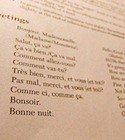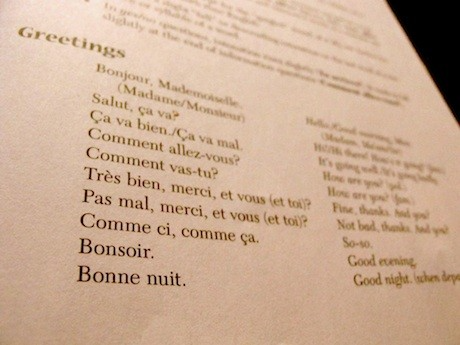French Lessons: Six Ways I’ve Tried to Learn French

Thu 28 Jun 2012

There have been two occasions in my life for which I’ve tried to learn French: one was a two-month sojourn to France, and the other was my current open-ended residence in Paris. I’ve tried so many different ways to learn French over the years that I feel I should be fluent by now, but I still stumble whenever a Frenchie says anything longer than 10 syllables to me. Maybe it’s because each method focused on a different way of learning, but my handle on French seems to be stuck at a level that includes being able to order food and discuss what I write, as well as a mélange of dirty words and curses. Oddly enough, none of my methods has included going to school. But not all French lessons are created equal. Here’s what has worked for me (and what hasn’t).
Pimsleur Method: This set of audio CDs focuses mostly on listening and responding. A dulcet French voice says something to you, and you then have 20 seconds to respond before the answer is given. It’s good to pound into your head entire phrases that are useful, like “Today I bought a T-shirt,” but I felt a little silly arguing with an imaginary stranger about what I would order to drink (this stranger never seemed to take “water” for an answer, and now that I live here I know why).
“Learn French” Records: I picked up this set of four vinyl records from a junk sale in SoHo for $1. Dating back to the 1960s, this tutorial promises fluency in eight weeks but included no corresponding text, so I would just sit in my room and repeat the months of the year or different greetings in French while enjoying the dust noise and staring out the window. In this case, I got what I paid for!
Rosetta Stone: This interactive computer program works if you do about nine lessons every day. It’s slow going but comprehensive, and hits four effective ways of learning: reading, listening, writing and speaking (get ready to shout repeatedly at your computer and confuse your neighbors). Strong visuals correspond to each sentence or phrase with its spelling and an adorable stock photo of what you’re learning. By this time I’ve made up names and salacious backstories for each of the characters in the lessons. (“They say he’s le père de Pierre, but I really think Julien is son père! Haven’t you seen the way Marie looks at him?”) I have also mastered the pronunciation of “My father is older than your father” but haven’t yet figured out how to say “My dad could beat up your dad.”
French in Action: This kitschy set of videos from the 1970s has a few lessons viewable on YouTube and follows an attractive young Parisienne through her days in the city. I learned a few good phrases, like Je suis pressée, but it’s mostly just fun to watch for the retro fashions.
French Boyfriend: They say this is an ideal (and the funnest) way to learn a language, and I heartily agree. If you have to spend all that time focusing on the different shapes a foreign mouth can make, why not have it be a mouth you can kiss? I one caveat, however: you’ll learn the most if he’s not fluent in English. If he is, all you’ll learn are heat-of-the-moment sweet nothings. Note: there is absolutely nothing wrong with sweet nothings uttered in French.
Immersion: It’s absolutely true that this is the best way to learn French or any other language. Pushing through your fear of being wrong or sounding silly is scary at first but becomes empowering. Living in a foreign country and hearing its language spoken everywhere, morning to night, on TV and radio, at the markets and by neighbors fighting upstairs, even when you’re just sitting at a café and listening to the chatty teenagers gossiping beside you, helps it seep in. Your brain is working even when you’re not aware of it. I learned more French during my first two weeks in Paris than I did in all those different language lessons combined. I also find that I speak fantastic French after two glasses of wine. But maybe it’s not the buzz that does it; maybe it’s just losing the fear of failing and letting oneself go for it. Because, really, the best way to learn is by making mistakes. Sure, everybody might laugh at a mistake you make, but then they’ll correct you and you’ll never forget that word again. (I once mispronounced the word for editor, monteuse, in front of a group of people and ended up telling them I used to be a female liar, menteuse, in New York.) After 10,000 mistakes, you’ll have yourself a nice little French vocabulary.
Bonne chance!
Related Links
Pimsleur Method
Rosetta Stone
French in Action
Editor’s note: GG2P has several methods to help you learn French in our Travel Club program. French in Paris is designed by a Parisian woman who can teach you exactly what you need to know in person or via Skype, without the many, many hours of grammar. You can then practice your French when you attend a Franglish session in Paris. Have fun, practice your French and meet Parisians!